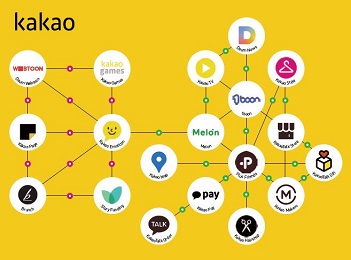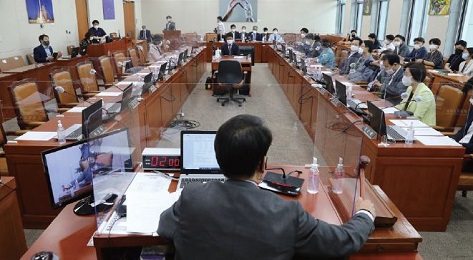Korea’s platform giants, Naver and Kakao, are currently being accused of abusing their dominant power in markets. According to the Fair Trade Commission (FTC) on September 23rd, the Fair Online Platform Intermediary Transactions Act and Act on the Consumer Protection on Electronic Commerce were being discussed in Congress to regulate major online platforms. To deal with this crisis, major online platforms are presenting various measures for coexistence, but people wonder whether these ways are realizable. Therefore, the Sungkyun Times (SKT) will introduce the growth of online platforms, problems that have led to current regulations, and controversies surrounding the regulation. Lastly, the SKT will suggest desirable ways for a balance and harmony between society and online platforms.

From Growth to Regulation of Online Platforms
Online Platforms and Platform Business
The word “platform” means the base for mediating and providing goods or services. It originates from the place where people get on and off the train in stations. “Mediating or providing” is the key meaning of the word as using a train without a platform is inconvenient. In other words, a platform is a place that connects groups and people, and various values and information are shared on the platform. Integrated with information technology (IT), online platforms became popularized, and online platforms can now be categorized as the following: 1) search engine-based such as Google and Naver, 2) e-commerce-based such as Amazon and Coupang, and 3) social network service-based such as Facebook and KakaoTalk. In addition, platform businesses have become vitalized as companies have started to make profits using platforms. Platforms act as the medium for consumers and manufacturers to exchange the values and goods they want in business fields. “Big Tech”, which refers to major technology companies, have also appeared with the growth of this business, and Kakao is now the leading Big Tech in Korea. Based on the messenger platform KakaoTalk, it expanded to finance and mobility markets, and the range of its expansion is limitless as various services are now available by using KakaoTalk.

Legislations Being Prepared to Regulate Online Platforms
Although businesses using platforms are convenient for both consumers and manufacturers, the market structure easily tends to be monopolized. Platforms start from providing a simple service, and once the service succeeds in the market, the platform becomes available to conduct countless other types of services. Since the “winner takes all” strategy is highly likely, Naver and Kakao are gaining stronger power and exerting their influences on most of the online business fields in Korea. Critical opinions towards this issue have been continuously raised, and with the growing influence of online platforms due to the pandemic situation, the government and Congress started to dive into regulating the platforms this September. Now, about 10 legislations regarding regulating online platforms are being discussed in Congress, and these aim to protect consumers and merchants, and to promote the fair competition of platforms. Consumer protection would be done by amending the Act on the Consumer Protection on Electronic Commerce. The amendment plans to expand the scope of liability of online platforms by mandating the platform to take responsibility when a consumer buys a product through the merchant of the platform. Additionally, by enacting the Fair Online Platform Intermediary Transactions Act, it will be necessary for a platform and a merchant to write a contract that includes the process of charging commission and the order of the products being shown on the platform. These kinds of measures will protect market operators of the platform. Lastly, to promote more fairness of the market, legislations that prevent the exposure of the platform’s private label products on top are being prepared.

Which Problems Led to the Regulation?
Threatening Local Businesses and Charging High Commission
Major online platforms have continuously expanded their business to local business fields. According to Chosun Biz, KakaoTalk is a national mobile messenger application, occupying 90% market share of the Korean mobile messenger market in 2020. Based on this popularity, Kakao has successfully advanced into both the mobility and finance markets. Currently, Kakao has expanded to local business fields such as chauffeur services, hair salons, and English academies, and this has become the issue of abusing its power. Not only Kakao, but also Coupang, which was originally an e-commerce platform, extended their range of business to quick commerce, grocery delivery, and food delivery services like Coupang Eats. As people tend to use a familiar platform in general and prefer a major platform due to its security, merchants start to depend on major online platforms to secure their market share. In a survey conducted by the Ministry of SMEs and Startups in 2021, 48% among 978 merchants who are using online platforms answered that it is impossible to run a business without using an online platform. This indicates that using an online platform is necessary to maintain or increase the sales of the store. Moreover, the high commission that a platform is charging to merchants has become controversial. The average commission of the e-commerce market is known to be 13.6%, and Coupang, which charges the highest fee, earns 18.3% commission from each store. This high commission harms both merchants and consumers, as consumers must pay an additional fee for buying the products or utilizing the service.

Problems of Utilizing Data Derived from the Platforms
The situation where major online platforms are monopolizing data has also become a problem. Professor Ju Jin-yul from the Law School of Pusan National University mentioned, “Currently, the FTC realized that data monopoly restricts fair competition, so it announced platform regulation.” Data refers to the information that users provide to a platform when using the service or buying products, and it includes consumers’ preferences of goods or contents and basic living or consuming patterns. Major online platforms monopolize the data derived from the stores in their platforms and use it in favor of their tastes. This ultimately leads to a dominant position in the market and makes it harder for other companies to enter the same market. For example, Coupang not only provides a sales platform, but also sells the same or similar products that its associated merchants sell. In this process, Coupang can collect various data such as sales status, repurchase rates, and consumer reviews from the stores, and then use this data to improve the quality of its own products or develop new products. In addition, it can provide individual recommendation services for customers. Like this, as major online platforms take the priority in the market by monopolizing data, many start-up companies are proposing that it is impossible to compete from the same starting line, and this problem may limit the options of consumers. What’s more serious is that the data from a platform may result in collusion among companies. As several stores on one certain platform use a data-based price arrangement system together, they might manipulate prices or supply intentionally. This can implicitly lead to “digital collusion” on the platform, and whether the “lowest price” of the platform was set by fair competition becomes questionable. Considering the current situation where most of the purchases are conducted through online platforms, collusion has also become a serious problem. The fact that digital collusion cannot be punished according to the current law leaves much to be improved.
Institutional Drawbacks Regarding M&A (Mergers and Acquisitions)
There exist several institutional problems of the way companies expand their businesses. Although major online platforms indiscriminately take over several small companies, the FTC is not able to control the problem. According to present criteria that judge business combinations, M&A among the companies classified to different types of business do not affect the market share. This does not consider the current situation where platforms are linking different types of companies and expanding their dominant powers. FTC used to omit indepth analysis if the market concentration ratio was below a certain degree after a business combination. “M&A Results of Kakao and Naver Affiliates in Current Five Years” from FTC indicate that among 76 cases from 2017 to the 1st half of 2021, all cases have passed regardless of vertical, horizontal, and conglomerate mergers. In addition, all cases excluding 10 cases were passed through simple processes without any in-depth analysis. Major online platforms are also strengthening their power in certain fields by taking over small-sized or start-up companies. As major online platforms can closely monitor the companies in competition, they might just take over other companies. An article from Hankyoreh indicates that Coupang sometimes just buys a company when the company is predicted to threaten Coupang itself. Like this, there are various institutional drawbacks regarding the way that platforms expand their business.

Future of Online Platforms
Controversies Surrounding the Regulation
After the lawmakers announced the regulation towards online platforms on September 7th, the stock price of Naver and Kakao dramatically decreased and left a big impact on the financial market the next day. Responding to this regulation, on September 14th, Kakao said that it would withdraw the services that were threatening local businesses and establish a mutual survival fund of 300 billion won for local businesses. However, these are deemed as temporary solutions trying to appease the public opinion in that Kakao has not announced the detailed implementation date and measures yet. On the contrary, some people say that the regulation is outdated and limits the growth of new businesses. Starting from platform regulation, other regulations in different fields may appear, and it would disturb the growth of various companies. Moreover, current regulation does not deal with high commission, which had continuously been an issue, so some people criticize this for its incompleteness.
Finding Ways for Desirable Coexistence
It is an important chance for Big Tech to re-establish their business policies. They should remember that making a favorable relationship with national customers is especially important as they mainly target domestic services. Rather than simply avoiding the regulations, Big Tech should try to build a win-win relationship with small enterprises by providing incentives such as lowering commission. Moreover, the regulation should not hinder the business owners who are trying to convert their businesses from offline to online. It is quite impossible for online users who seek convenience to use offline markets, so rather than regulating the platform itself, seeking for the way to coexist within a platform is necessary. Lawmakers and the government should find ways for small enterprises to enter the platform, and supporting start-up companies to make a new platform to prevent the monopoly of major platforms can be another way. Lastly, improving M&A judgement processes is also an important task to control the situation where major companies are dominating their power. Reinforcing the budget and supplementing human resources would be able to improve the system.

Several Big Tech companies, which were once the icons of technological innovation, are facing a crisis due to the current regulations. This also brought a chance to think about various problems that were forgotten in convenient daily lives using the platform. Now, it is time to contemplate if major online platforms have become autocrats of small business owners, insisting on the fact that most people are users. For the better coexistence of online platforms and various businesses, continuous discussions and feedback would be needed.
